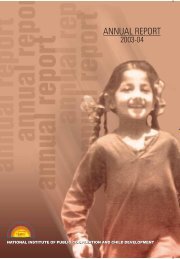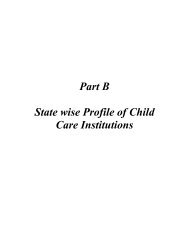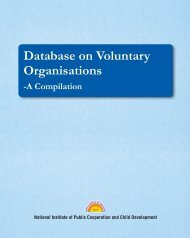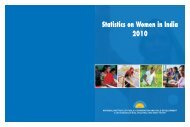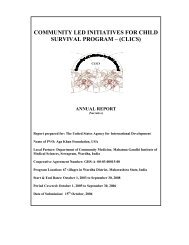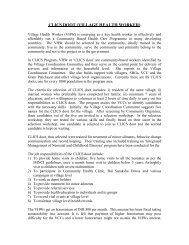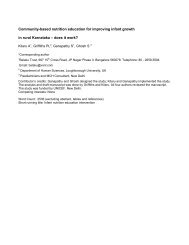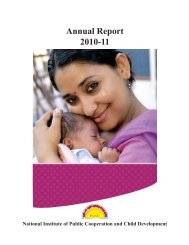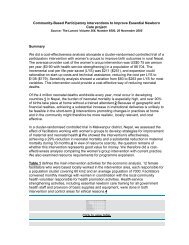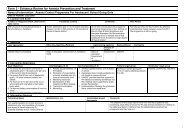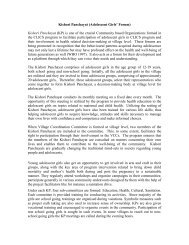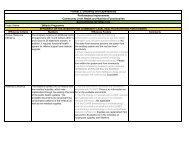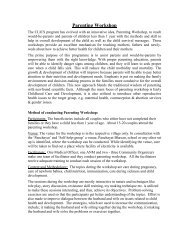Research Abstracts on Child Labour Women Labour - Nipccd
Research Abstracts on Child Labour Women Labour - Nipccd
Research Abstracts on Child Labour Women Labour - Nipccd
You also want an ePaper? Increase the reach of your titles
YUMPU automatically turns print PDFs into web optimized ePapers that Google loves.
Drug Abuse<br />
Mohan, Jitendra, et al. (1998).<br />
Drug abuse am<strong>on</strong>g child workers : an exploratory survey. Chandigarh : Punjab Univ,<br />
Dep of Psychology. 186 p.<br />
Key Words : 1.CHILD LABOUR 2.CHILD LABOUR-DRUG ABUSE 3.WORKING CONDITION 4.DRUG<br />
ABUSE 5.CASE STUDY 6.CHILDREN IN DIFFICULT CIRCUMSTANCES.<br />
Abstract : The present study focussed <strong>on</strong> the problem of drug abuse am<strong>on</strong>g male child<br />
workers in Punjab. The study covered male 200 drug users and 200 male n<strong>on</strong>-drug users<br />
am<strong>on</strong>g child workers from the cities of Chandigarh, Ludhiana and Jalandhar. Data revealed<br />
that majority of drug users am<strong>on</strong>g child workers were younger, predominantly Hindus and<br />
scheduled caste or OBC in comparis<strong>on</strong> to the n<strong>on</strong> users of drugs working in similar<br />
c<strong>on</strong>diti<strong>on</strong>s. About 50% of the users had no educati<strong>on</strong> and 40% had educati<strong>on</strong> up to primary<br />
level, whereas the n<strong>on</strong>-users included 7.5% matric and 25% educated up to middle level.<br />
Due to poverty children worked under unsatisfactory working c<strong>on</strong>diti<strong>on</strong>s. It was the in-thing<br />
to smoke/drink/abuse drugs in the group to which these children bel<strong>on</strong>ged. Drug abuse was<br />
introduced to them by their friends (60%), co-workers (30%) and fathers (10%). Fathers<br />
of 70% drug users and friends and siblings of 50% drug users were also using drugs. Even<br />
the employers were using drugs. About 50% of them were willing to leave drugs. 40% drug<br />
users and 37.5% n<strong>on</strong> drug users would like to study, if given a chance. The remaining would<br />
prefer to keep <strong>on</strong> working and not study. N<strong>on</strong> drug users (37.5%) were more uncertain<br />
about their future plan than the drug users (10%). 60% of the drug users would like to<br />
c<strong>on</strong>tinue with the same work, whereas 30% of the drug users and 52.5% of the n<strong>on</strong> drug<br />
users want better and alternative jobs. It was observed that 70% of the users had no<br />
suggesti<strong>on</strong>s to offer while 30% suggested that the Government or some agency should do<br />
something and help them to study. From the above study it was found that children work<br />
due to poverty; working c<strong>on</strong>diti<strong>on</strong>s, wages and work itself was not at all satisfying; and<br />
general awareness about their future is absent. Hence, it was recommended that the<br />
problem should be tackled with the joint collaborati<strong>on</strong> of different agencies, by pooling<br />
resources, manpower and know how, so that meaningful social acti<strong>on</strong> could be taken up. It<br />
also recommended preventive strategies at primary, sec<strong>on</strong>dary and tertiary levels. Early<br />
preventi<strong>on</strong> and early treatment c<strong>on</strong>stituted early interventi<strong>on</strong> activity. At the nati<strong>on</strong>al level,<br />
policies and programmes regarding drug abuse must be supported by a well c<strong>on</strong>ceived<br />
organizati<strong>on</strong>al structure, that has the full support of government.<br />
21<br />
<str<strong>on</strong>g>Research</str<strong>on</strong>g> <str<strong>on</strong>g>Abstracts</str<strong>on</strong>g> <strong>on</strong> <strong>Child</strong> <strong>Labour</strong>, <strong>Labour</strong> and <strong>Women</strong> <strong>Labour</strong> 1998 - 2009



